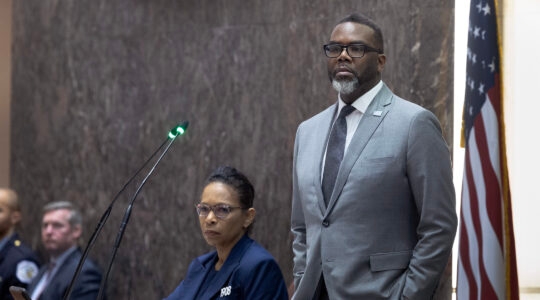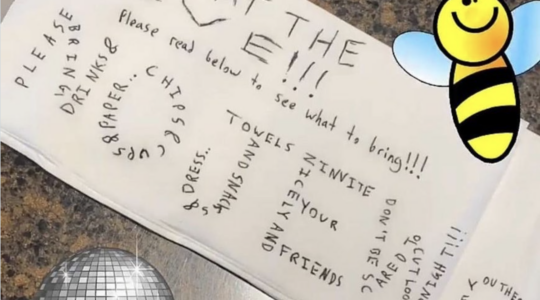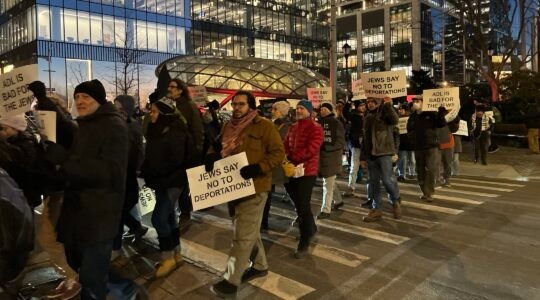(JTA) — President Donald Trump said he has not ruled out inviting Prime Minister Benjamin Netanyahu to join him when he visits Jerusalem’s Western Wall.
“We have not yet made a final decision about my visit to the Western Wall,” Trump, who is scheduled to visit Israel next week, told the Israel Hayom newspaper in an interview Thursday. “We have great respect for Prime Minister Benjamin Netanyahu, and the decision to have the rabbi [of the Western Wall] accompany us was primarily because that is the custom at the site. It could still change.”
On Tuesday, the White House announced that Trump would not be accompanied by any Israeli officials when he visits the holy site on Tuesday.
“No Israeli leaders will join President Trump to the Western Wall,” National Security Adviser H.R. McMaster told reporters at a news briefing at which he outlined Trump’s schedule for his four-stop trip to the Middle East, including Saudi Arabia, and Europe.
The Western Wall, part of the retaining walls of the Second Temple compound, is the closest point of prayer for Jews to the site of the Temple itself and thus the Jewish people’s holiest place of prayer. Israel annexed eastern Jerusalem after capturing it from Jordan in 1967. Muslim countries, including Saudi Arabia, have criticized Israel’s presence in Jerusalem and particularly its actions in the Old City around the Western Wall.
No serving U.S. president has ever visited the Western Wall because U.S. policy has been that the final status of Jerusalem has yet to be resolved in Israeli-Palestinian negotiations.
Rabbi Marvin Hier — the dean and founder of the Simon Wiesenthal Center in Los Angeles who participated in Trump’s inauguration ceremony in January — told The Algemeiner earlier this week that he was displeased with the administration’s plan of having Trump visit the Western Wall without Netanyahu. It was akin to “visiting the Vatican without the Pope,” Hier said.
Trump also told the Israel Hayom daily that he “honestly, truly” thinks he can broker a peace deal between Israel and the Palestinians, and was noncommittal on the question of moving the U.S. Embassy to Jerusalem from Tel Aviv.
The Western Wall has been at the center of a diplomatic spat between the U.S. and Israel over the past week after an American diplomat reportedly told Israeli officials that the Western Wall was not part of Israel and not Israel’s responsibility.
According to an Israeli Channel 2 TV report, the tensions were sparked when a team of Israeli officials working to coordinate Trump’s visit asked their American counterparts in a meeting early last week whether Netanyahu could accompany the president when he goes to the Western Wall, a key expected stop on his May 22-23 visit.
The U.S. officials reportedly rejected the request for Netanyahu to join the visit, saying it would be “a private visit” by the president and that he would go on his own. The Israelis then asked whether a TV crew providing live coverage of the Trump visit could at least continue to film there.
At this point, the TV report said, a senior American official, later identified as David Berns, the political counselor at the U.S. Consulate in Jerusalem, responded: “What are you talking about? It’s none of your business. It’s not even part of your responsibility. It’s not your territory. It’s part of the West Bank.”
The comments led to vociferous protests by the Israelis, with the discussion descending into shouting and the Israelis reminding the U.S. team that the Western Wall and adjacent area “is territory holy to Israel.”
After publication of the remarks on Monday evening, Netanyahu’s office sought clarifications from the White House and said it did not believe the comments reflected Trump’s views.
Shortly afterward, the White House told JTA, “The comments about the Western Wall were not authorized communication and they do not represent the position of the United States and certainly not of the president.”
In the Oval Office interview with Israel Hayom, Trump repeated his belief that he would be able to achieve a peace agreement between Israel and the Palestinians.
“I think that there is a great opportunity to reach a deal [between Netanyahu and Palestinian Authority President Mahmoud Abbas],” the president said. “I am working very hard so that finally the Israelis and Palestinians will have peace, and I hope that this can happen quicker than anyone ever imagined.”
JTA has documented Jewish history in real-time for over a century. Keep our journalism strong by joining us in supporting independent, award-winning reporting.





